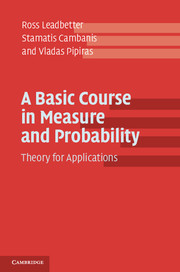Book contents
- Frontmatter
- Contents
- Preface
- Acknowledgements
- 1 Point sets and certain classes of sets
- 2 Measures: general properties and extension
- 3 Measurable functions and transformations
- 4 The integral
- 5 Absolute continuity and related topics
- 6 Convergence of measurable functions, Lp-spaces
- 7 Product spaces
- 8 Integrating complex functions, Fourier theory and related topics
- 9 Foundations of probability
- 10 Independence
- 11 Convergence and related topics 223
- 12 Characteristic functions and central limit theorems
- 13 Conditioning
- 14 Martingales
- 15 Basic structure of stochastic processes
- References
- Index
11 - Convergence and related topics 223
Published online by Cambridge University Press: 05 June 2014
- Frontmatter
- Contents
- Preface
- Acknowledgements
- 1 Point sets and certain classes of sets
- 2 Measures: general properties and extension
- 3 Measurable functions and transformations
- 4 The integral
- 5 Absolute continuity and related topics
- 6 Convergence of measurable functions, Lp-spaces
- 7 Product spaces
- 8 Integrating complex functions, Fourier theory and related topics
- 9 Foundations of probability
- 10 Independence
- 11 Convergence and related topics 223
- 12 Characteristic functions and central limit theorems
- 13 Conditioning
- 14 Martingales
- 15 Basic structure of stochastic processes
- References
- Index
Summary
Modes of probabilistic convergence
Various modes of convergence of measurable functions to a limit function were considered in Chapter 6, and will be restated here with the special terminology customarily used in the probabilistic context. In this section the modes of convergence all concern a sequence {ξn} of r.v.'s on the same probability space (Ω, F, P) such that the values ξn(ω) “become close” (in some “local” or “global” sense) to a “limiting r.v.” ξ(ω)as n → ∞. In the next section we shall consider the weaker form of convergence where the ξn's can be defined on different spaces, and where one is interested in only the limiting form of the distribution of the ξn (i.e. Pξ-1n B for Borel sets B). This “convergence in distribution” has wide use in statistical theory and application.
The later sections of the chapter will be concerned with various important relationships between the forms of convergence, convergence of series of independent r.v.'s, and related topics. Note that in certain calculations concerning convergence (especially in Section 11.5) it will be implicitly assumed that the r.v.'s involved are defined for all ω. No comment will be made in these cases, since it is a trivial matter to obtain these results for r.v.'s ξn not defined everywhere by considering ξ*n defined for all ω, and equal to ξna.s.
- Type
- Chapter
- Information
- A Basic Course in Measure and ProbabilityTheory for Applications, pp. 223 - 253Publisher: Cambridge University PressPrint publication year: 2014



